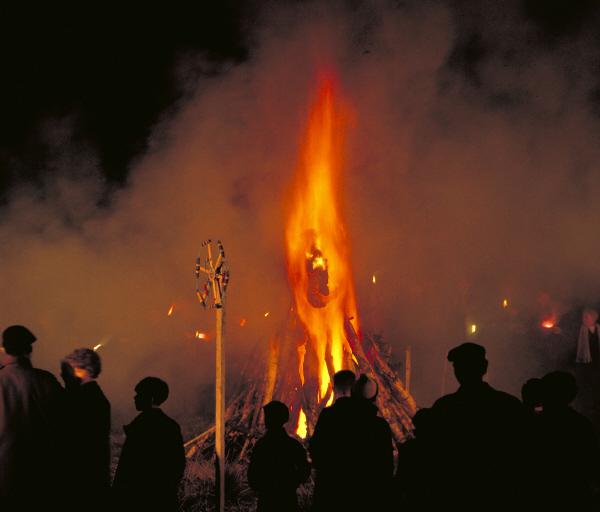Guy Fawkes Night or Bonfire Night (5th November, United Kingdom)
Guy Fawkes Night or Bonfire Night
On November 4, 1605, Guy Fawkes was caught red-handed in the basement of the British Parliament. He was trying to blow up the Houses of Parliament with gunpowder. Ever since then, on November 5, the British have celebrated his capture and execution by burning an effigy (model) of him on bonfires around the nation. Learn more about why he wanted to blow up Parliament, how he was caught and the celebrations.
Although the plot involved blowing up the Houses of Parliament, it was mainly intended to Kill King James I. James had actually started out as King James VI of Scotland. When Queen Elizabeth I died, he was her nearest living relative, and so he became King of England.
Why did it happen?
At the time, England was divided on religious grounds. Elizabeth was a protestant, and Head of the Church of England. She persecuted the Catholics and had many priests and important Catholics executed. Needless to say, the Catholics weren't very happy about this. When she died they danced in the streets and celebrated her death. James had given the Catholics a private promise that he would stop the persecutions, if he became King.
As the Catholics were soon to learn, people will say anything to get power. James may have really intended helping the Catholics, but Parliament was against them, and he continued on where Elizabeth had left off.
The whole problem had begun with Henry VIII, Elizabeth's father. England had been Catholic and the Church had had a lot power. Henry had fallen out with the Pope because he couldn't get divorced. He had then formed the Church of England, declaring himself its Head, and given himself a divorce. The Catholics were determined to restore their Church to power and get rid of the Church of England. Unfortunately members of the Church of England felt exactly the same way. A group of English Catholics was fighting with the Spanish Army. They hoped that if they managed to get rid of James, the Spanish could come in and conquer England. Then they could restore the Catholic Church to its powerful position.
Who and how?
Some of these Catholics got together, recruited Guy Fawkes to do the dirty work, and hatched their plot. First, they rented a house with a basement that lay under the House of Lords (part of the Houses of Parliament). Then, they moved barrels of gunpowder into the basement, hiding it under piles of wood. They needed to blow up the building when King James, his family and all of the non-Catholic members of Parliament were in it. This had to be the day Parliament opened for a new session. That year, due to fear of plague, the opening of the Houses of Parliament was delayed for over 8 months. The delay meant the plot failed.
Too many people got to hear about the plot. Someone who knew about it had a relative who was a Member of Parliament. Not wanting his relative killed, he sent him a message telling him about the plot. The relative, Lord Monteagle, sent the letter to the King. The plotters knew that someone had told about the plot, but were determined to carry on anyway. Guy Fawkes, under the alias of John Johnson, was arrested in the basement, just a few hours before he was due to light the fuse.
He was taken to the Tower of London, tortured until he signed a confession, and publicly executed on January 31, 1606. The other plotters were hunted down and shot or executed.


The commemoration
The tradition of lighting bonfires on November 5, started the same year as the plot itself. People, happy that the King had been saved, lit bonfires in the streets. Over the years the celebrations became more elaborate, and effigies of Guy Fawkes and even the Pope were added to the top of the fires. Fireworks came a little later. All towns and villages used to have a fire, then the tradition became for people to have private fires and firework displays.
Children make their effigies (or dummies) and parade them in the streets before bonfire night. They ask for "a penny for the Guy" and use the money collected to buy fireworks. Because of increased safety regulations most towns and villages have begun having public bonfires again. These days private bonfires are few and there are not many "Guys" on display in the streets.
Remember, remember the fifth of November,
Gunpowder, treason and plot.
We see no reason
Why Gunpowder treason
Should ever be forgot.


http://www.funsocialstudies.learninghaven.com/articles/guyfawkes.htm
